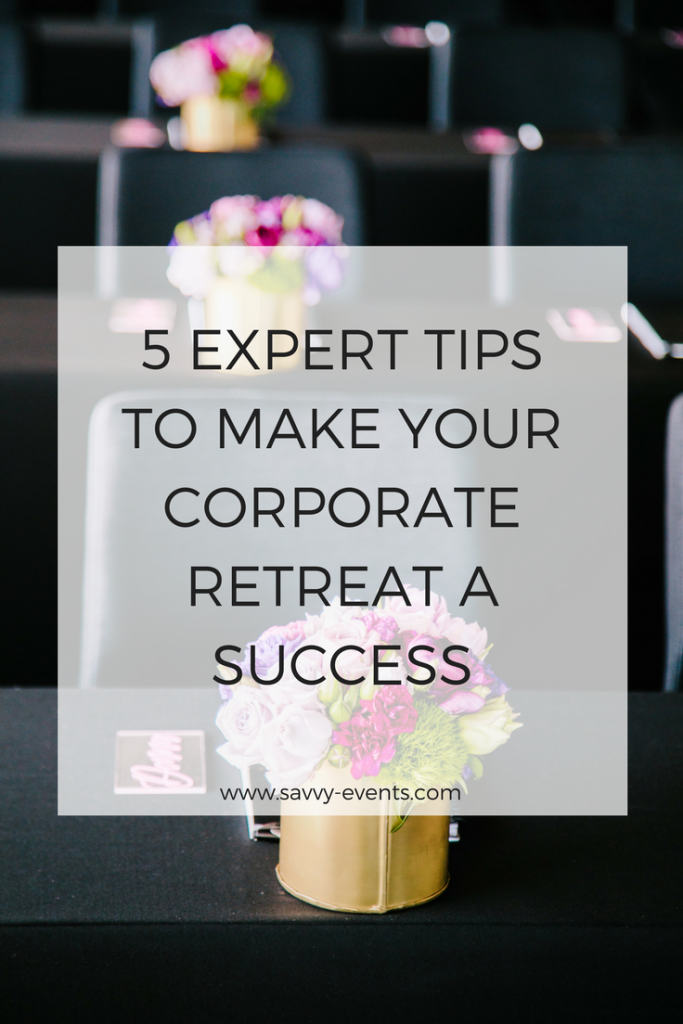5 Expert Tips to Make Your Corporate Retreat a Success
Your next corporate retreat should be memorable, intentional, and enjoyable. Planning for an event on such a grand scale can be overwhelming, but trust us, it doesn’t have to be. I know you’re probably thinking, “you’re an event production company, of course, you don’t think the planning process will be difficult.” Well, we are a team of event producers, but we’re confident that if you implement the following strategies into the planning process for your conference, you’ll have clarity and direction to hit the ground running. With the help of the tips below and your event planner, your company conference is sure to be a success.
- Plan early
Getting the ball rolling on planning your corporate retreat is critical. Venues book early—sometimes years in advance. If you have a clear vision for your event, contact your preferred venue as soon as possible. If you need assistance with sourcing a venue for your event and managing your room block, get in touch, as this is a service we offer our clients.
Getting a jump on other plans is also critical, especially in a market like Los Angeles where Savvy is based. The larger your guest list, the earlier you should begin your planning.
Will you be needing overnight accommodations for your attendees? Does your venue offer this service, or will daytime activities be held off-site? If so, you will need to arrange transportation for the group at the start and end of each day.
Meals, both during and after daytime activities, must also be coordinated. Be sure you book catering well in advance, particularly if you have a very specific theme in mind. (And if not, your planner can help!)
Generally speaking, any activities that will involve vendors should be settled before getting into the heart of your retreat’s content.
- Create an experience
Your corporate retreat isn’t just an event—it’s an experience. From the venue to the food, décor, speaker line-up, and activities, all of your retreat elements must align properly to create the perfect ambiance and overall feeling for your attendees.
Business retreats should be informative, engaging, and leave attendees with lasting strategies to improve their performance for your company. These goals can be achieved while also treating your staff to a well-crafted experience. The goodwill, friendships, and morale that result from a top-notch experience at a corporate retreat pay dividends throughout the year.
- Team-building activities
No corporate retreat is complete without some great team-building! Aim to select activities that will push your employees to interact in new ways.
Keep activities professional, however, and steer clear of anything overly personal or physical. Popular team-building options, like a ropes course, should be offered as optional in case of an employee with physical limitations.
Lightly competitive activities, such as scavenger hunts or relay races, are great options to maximize engagement.
- Focus on the “why”
A corporate retreat is a great move for enhancing workplace culture and boosting morale. Before you get too far with planning, however, it’s important to consider your purpose. Why is your company hosting the retreat? What do you hope your employees will gain?
According to Inc.com, “strategic planning” is not a good enough “why.” You need to have specific, actionable goals in mind before planning your conference.
Determining the “why” is something that should be done at the start of the planning process, but revisiting the “why” should be done frequently throughout. If you aren’t sure how an activity or lecture will benefit your business or employees, it shouldn’t be included in the retreat.
Forbes.com even recommends surveying employees ahead of the retreat to determine what they hope to get out of it. This is an excellent strategy to personalize the experience to your attendees and ensure that the retreat’s value is maximized for all parties. Questions like “How do you think the company could improve your experience?” and “Where would you like to see the company in one year?” can help to shape the sort of retreat you should be planning.
- Get feedback post-conference.
Companies often focus on pre-event surveys but don’t forget about the importance of administering a post-event survey. Find out what employees liked, what they didn’t, and what they’d like to see done differently in the future. Have staff describe their experience. You have a great opportunity here to find out how successful your work on step two really was!
Ultimately, a corporate retreat can shape company culture for the long haul. Planning a conference that effectively combines work and play can be challenging, but creating the best possible experience for your employees doesn’t have to be. Your planner is here to help, so get the ball rolling early for a wonderful retreat that no one will forget!
Be sure to pin the graphic below to save these tips for later.

close X
Work With Us
Your vision. Our creativity. Let’s make it happen.
We’re ready to collaborate with you to create powerful brand experiences that inspire, engage, and elevate. Reach out to us today to start your next project.